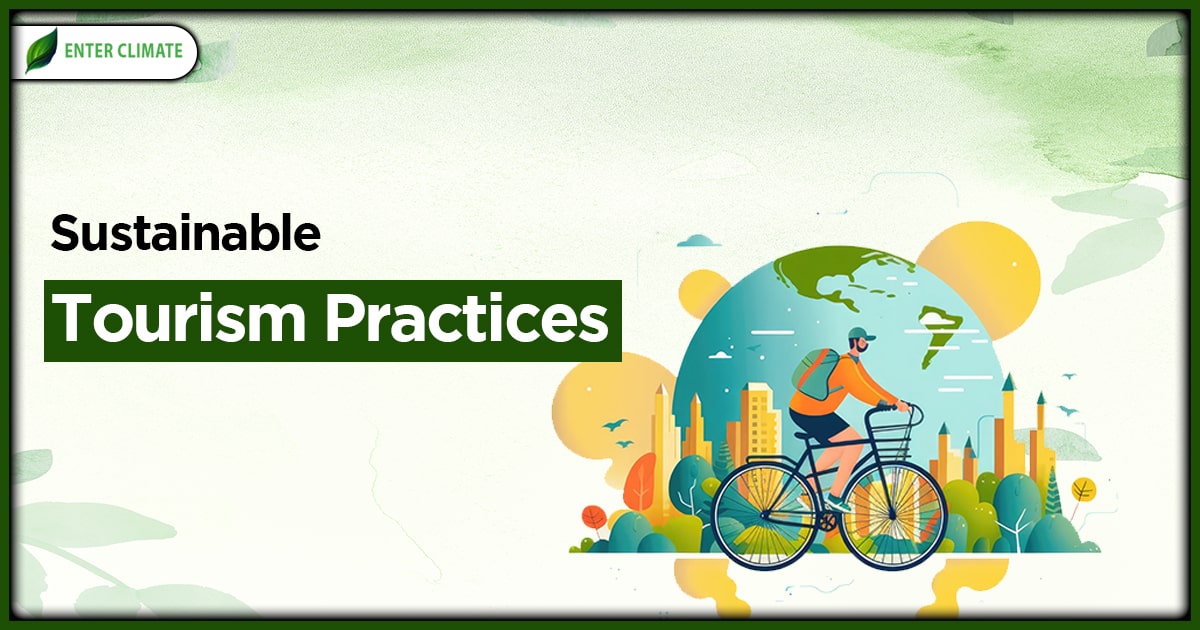
Introduction
Traveling is a wonderful way to explore the world and create lasting memories. However, it also has an impact on the environment, contributing to carbon emissions and waste. As travelers, it’s important to be mindful of our impact and strive to make eco-friendly choices. In this article, we’ll explore various ways to reduce your carbon footprint while traveling and support sustainable tourism.
1. Understanding Eco-Friendly Travel
Understanding eco-friendly travel is about recognizing the impact of our travel choices on the environment and local communities, and actively seeking to minimize that impact. It involves adopting practices that reduce carbon emissions, conserve natural resources, and support sustainable tourism. Eco-friendly travelers prioritize staying in accommodations that have implemented green initiatives, such as energy and water conservation measures, waste reduction, and support for local communities. They choose transportation options that minimize carbon footprint, such as walking, cycling, or using public transportation, and opt for non-stop flights and economy class when flying is necessary. Eco-friendly travelers also make conscious decisions about where and what they eat, choosing locally sourced, organic food to support local farmers and reduce food miles. They engage in responsible wildlife encounters, respecting animals’ natural habitats and avoiding activities that harm or exploit wildlife.
2. Choosing Eco-Friendly Accommodation

Choosing eco-friendly accommodation involves selecting lodging options that prioritize sustainability and environmental responsibility. This includes staying in hotels, resorts, or lodges that have implemented green practices, such as energy and water conservation, waste reduction, and support for local communities. Eco-friendly accommodations often have eco-certifications, such as LEED certification, or are members of sustainable tourism organizations. These establishments may use renewable energy sources, such as solar or wind power, and employ energy-efficient lighting and appliances. They may also implement water-saving measures, such as low-flow toilets and showers, and use eco-friendly cleaning products. Additionally, eco-friendly accommodations may support local communities by hiring local staff, sourcing food and products locally, and engaging in community development projects. By choosing eco-friendly accommodation, travelers can reduce their environmental impact and support businesses that are committed to sustainability.
3. Transportation: Minimizing Carbon Footprint
Transportation plays a significant role in a traveler’s carbon footprint, and minimizing this impact is crucial for eco-friendly travel. One of the most effective ways to reduce carbon emissions is to choose modes of transportation that are more sustainable. For short distances, walking or cycling can be excellent options, as they produce zero emissions and also offer health benefits. Public transportation, such as buses and trains, is another eco-friendly choice, as it can significantly reduce the number of individual vehicles on the road. When flying is necessary, travelers can reduce their carbon footprint by choosing non-stop flights, as take-offs and landings produce the most emissions. Additionally, opting for economy class seats is more carbon-efficient, as more passengers can be accommodated per flight. Another way to minimize the environmental impact of transportation is to consider alternative fuels, such as biofuels or electric vehicles, when available. By making conscious choices about transportation, travelers can significantly reduce their carbon footprint and contribute to a more sustainable travel experience.
4. Eating and Drinking Sustainably

Eating and drinking sustainably entails making conscious choices that minimize harm to the environment, support local economies, and promote ethical treatment of animals. It involves consuming foods and beverages that are produced, harvested, and distributed in ways that conserve natural resources and reduce greenhouse gas emissions. This can include opting for organic produce to avoid harmful pesticides and chemicals, choosing sustainably sourced seafood to protect marine ecosystems, and supporting regenerative agriculture practices that enrich soil health and biodiversity. Additionally, consuming plant-based meals reduces the environmental footprint associated with animal agriculture, such as deforestation and water pollution. Choosing reusable containers and avoiding single-use plastics further reduces waste and promotes a circular economy. By embracing sustainable eating and drinking habits, individuals can play a vital role in mitigating climate change, preserving natural habitats, and promoting a healthier planet for future generations.
5. Responsible Wildlife Encounters

Responsible wildlife encounters are paramount for the conservation of our planet’s diverse ecosystems and the well-being of the animals inhabiting them. When engaging with wildlife, whether it be observing them in their natural habitat or interacting with them in controlled environments such as wildlife sanctuaries, it is essential to prioritize their welfare and minimize any potential harm or disturbance. This begins with respecting their space and natural behaviors, avoiding any actions that could cause stress or fear. It’s crucial to stay at a safe distance, using binoculars or telephoto lenses for close observation, rather than intruding into their environment. Additionally, refraining from feeding wild animals is vital, as it can disrupt their natural foraging behaviors, lead to dependency on humans, and even cause health issues. When visiting wildlife habitats, adhering to designated trails and guidelines set by conservation authorities helps mitigate human impact and preserve the delicate balance of these ecosystems. Moreover, ensuring that any waste or litter is properly disposed of minimizes pollution and protects wildlife from ingesting harmful materials.
6. Supporting Local Communities
Supporting local communities is vital for fostering economic growth, social cohesion, and sustainable development. When individuals and businesses choose to invest in local goods, services, and initiatives, they directly contribute to the prosperity of their communities. By patronizing local businesses, residents keep money circulating within the local economy, creating a multiplier effect that generates additional jobs and income. Furthermore, supporting local artisans, farmers, and producers not only preserves cultural heritage and traditions but also promotes environmental sustainability by reducing the carbon footprint associated with transportation and distribution. Local community support also strengthens social ties and fosters a sense of belonging and pride among residents, leading to greater civic engagement and participation in local governance. Additionally, investing in local infrastructure, education, and healthcare facilities enhances the overall quality of life for community members, making the area more attractive for residents and businesses alike. Ultimately, by prioritizing local communities, individuals and organizations contribute to building resilient, vibrant, and thriving societies where everyone has the opportunity to prosper.
7. Packing Light and Smart
Packing light and smart is the art of maximizing efficiency and minimizing unnecessary items when preparing for travel. It involves thoughtful consideration of essentials versus luxuries, versatile clothing choices, and strategic organization techniques. Start by making a detailed packing list tailored to your destination, duration of stay, and planned activities, prioritizing multi-purpose items that can be worn or used in various situations. Opt for lightweight and wrinkle-resistant clothing made from quick-drying fabrics, which can be easily layered for warmth or stripped down for cooler temperatures. Choose a versatile color palette to mix and match outfits, reducing the number of garments needed. Utilize packing cubes or compression bags to maximize space and keep belongings organized within your luggage, and consider the dual-purpose of items such as scarves or sarongs, which can serve as clothing accessories, beach towels, or picnic blankets. Minimize toiletries by opting for travel-sized containers or purchasing essentials upon arrival to avoid bulky bottles.
8. Reducing, Reusing, and Recycling on the Road

Reducing, reusing, and recycling on the road is crucial for mitigating environmental impact and promoting sustainable travel practices. To reduce waste, travelers can opt for digital maps and navigation systems instead of printed ones, minimizing paper usage. Additionally, choosing reusable water bottles, coffee mugs, and utensils reduces single-use plastic consumption. Utilizing public transportation, carpooling, or biking instead of driving alone not only decreases carbon emissions but also alleviates traffic congestion. When it comes to recycling, travelers should dispose of waste responsibly by separating recyclables from general trash and utilizing designated recycling bins. Furthermore, embracing a “pack it in, pack it out” mentality ensures that any waste generated during travel is properly disposed of or recycled, minimizing litter and preserving natural landscapes. By adopting these practices, travelers can contribute to a cleaner, greener planet while enjoying their journeys on the road.
9. Eco-Friendly Activities and Tours

Embarking on eco-friendly activities and tours is not only a way to connect with nature but also a means to minimize your carbon footprint and contribute to the preservation of our planet. Whether it’s exploring pristine natural landscapes, participating in conservation efforts, or immersing yourself in sustainable practices, there’s a plethora of options available for the eco-conscious traveler. Consider trekking through biodiverse rainforests, where you can observe exotic wildlife in their natural habitat while supporting local ecotourism initiatives aimed at protecting fragile ecosystems. Alternatively, opt for bicycle tours through scenic countryside routes, reducing emissions while enjoying the fresh air and panoramic views. Participating in beach clean-up activities allows you to give back to coastal communities and safeguard marine environments from pollution. For a deeper understanding of sustainable living, join eco-friendly farm stays or agro-tourism experiences, where you can learn about organic farming practices and indulge in farm-to-table dining experiences. Additionally, eco-conscious travelers can opt for responsible wildlife encounters, such as ethical animal sanctuaries or whale watching tours that prioritize the welfare of animals and their habitats. Engaging in eco-friendly activities and tours not only enriches your travel experience but also promotes environmental stewardship and fosters a more sustainable future for generations to come.
10. Spreading Awareness and Advocacy
Spreading awareness and advocacy are crucial components in effecting positive change within society. It involves disseminating information, educating individuals, and mobilizing communities to address various social, environmental, and political issues. Through awareness campaigns, people are made cognizant of pressing concerns such as climate change, human rights violations, gender equality, mental health stigma, and more. Advocacy goes beyond mere awareness-raising; it entails actively championing for policy changes, promoting inclusive practices, and standing up for marginalized communities. Whether it’s through grassroots movements, social media campaigns, educational programs, or lobbying efforts, spreading awareness and advocacy play instrumental roles in fostering empathy, understanding, and collective action. By amplifying voices, challenging systemic injustices, and fostering solidarity, individuals and organizations can catalyze meaningful transformation and create a more equitable and sustainable world for current and future generations.
Conclusion
In conclusion, adopting eco-friendly travel practices is not just a matter of personal preference; it’s a responsibility we owe to our planet and future generations. By making conscious choices such as opting for sustainable transportation, reducing waste, supporting local communities, and respecting natural habitats, travelers can minimize their environmental footprint while experiencing the world responsibly. While the travel industry continues to evolve, it’s imperative for both travelers and travel providers to prioritize sustainability and conservation efforts. Through collective action and individual commitment, we can preserve the beauty of our planet and ensure that it remains accessible and vibrant for generations to come. Embracing eco-friendly travel practices isn’t just about where we go; it’s about how we get there and the impact we leave behind. Let’s journey with mindfulness, leaving behind memories while safeguarding the environment for future explorers.




